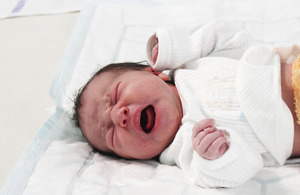Latest whooping cough cases published by PHE
Figures published by Public Health England (PHE) today show that confirmed cases of whooping cough in England have continued to decrease in 2013 with 434 cases reported in March.

Crying baby
This compares to 544 confirmed cases in February and 650 in January.
This will be the fifth month running that cases have decreased, however numbers remain unusually high following a sustained outbreak during 2012 which saw a record 9,741 cases.
This report comes as Public Health England, the Department of Health and NHS England confirm the extension of the vaccination campaign to immunise all pregnant women against whooping cough between week 28 and 38 of their pregnancy. The aim of vaccinating women at this stage in pregnancy is to offer babies protection against whooping cough in the first few months of life, before they are old enough to receive their own vaccines.
The programme should continue to be delivered through primary care, although local arrangements may allow for the delivery of the programme through other routes, such as midwifery services. Midwives should offer vaccination or ensure that pregnant women are informed of the programme and advised to make an appointment with their GP or other appropriate provider in order to be vaccinated.
Dr Gayatri Amirthalingam, consultant epidemiologist for immunisation at PHE, said:
The March figures show a welcome continued decrease in the number of whooping cough cases since October and we hope this will continue as pregnant women continue to get vaccinated.
We also welcome and fully support the continuation of the vaccination campaign for pregnant women and we encourage all women at the recommended stage of pregnancy to get an appointment and ensure they receive their whooping cough vaccine.
It is also important for parents to ensure their children are vaccinated against whooping cough on time, even babies of women who’ve had the vaccine in pregnancy – this is to continue their baby’s protection through childhood.
Whooping cough, also known as pertussis, affects all ages. Young infants are at highest risk of severe complications and death from whooping cough as babies do not complete vaccination until they are around four months old. In older children and adults whooping cough can be an unpleasant illness but it does not usually lead to serious complications. Whooping cough is a highly infectious bacterial disease which spreads when a person with the infection coughs and sheds the bacteria which is then inhaled by another person.
Dr Amirthalingam continued:
Parents should also be alert to the signs and symptoms of whooping cough – which include severe coughing fits accompanied by the characteristic ‘whoop’ sound in young children but as a prolonged cough in older children or adults.
Whooping cough vaccination programme for pregnant women extended to 2014